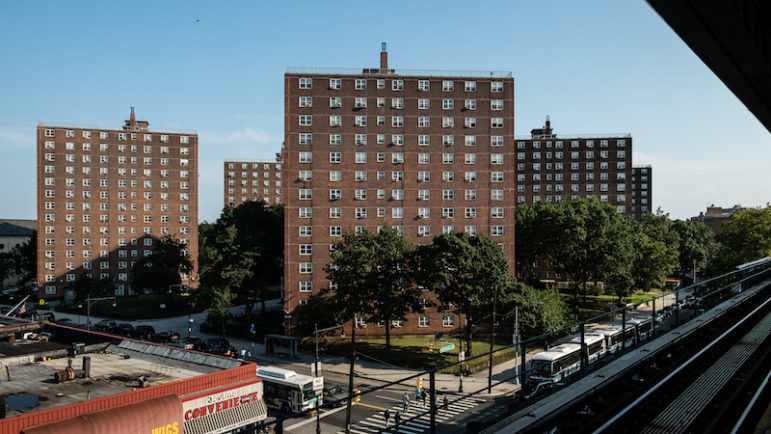The housing authority managed to balance its books last year, and an infusion of federal support will help it do so in 2021. But budget gaps of $300 million or more lurk in 2022 and beyond.

Adi Talwar
The Gun Hill Houses in the Bronx, as seen from the 2/5 platform along White Plains Road.COVID-19 hit the New York City Housing Authority hard, killing residents, throwing tenants out of work and reducing the incomes upon which the authority’s rent revenue is based. Thanks to continued city support, solid federal aid and some nimble cash management, NYCHA finished 2020 in the black and faces a very small deficit in calendar 2021, according to a report released this week by the city’s Independent Budget Office.
The future looks a lot darker.
IBO says NYCHA’s own projection for its 2022 budget, which back in December 2019 forecast a $75 million deficit, now shows a $300 million shortfall. What was supposed to be a $85 million deficit in 2023 now looms at $363 million and the gap in 2024 has swelled from $77 million to $319 million.
The yawning deficits come despite much deeper support from the city budget than existed before Mayor Bill de Blasio’s tenure: On his own volition and then under federal pressure, de Blasio boosted funding from the $2.3 million that Mayor Mike Bloomberg spent on NYCHA in his last full budget year to $273 million in de Blasio’s most recent completed fiscal cycle.
The growing budget stress reflects a number of factors. The pandemic-related federal aid has been largely a one-shot deal. The reforms imposed by the federal monitor have led to hiring hundreds of new employees. And while the plans NYCHA has put in place to address its massive backlog in repair work—converting 62,000 apartments to Section 8 through a mechanism known as PACT/RAD and creating a public authority to use federal tenant-relocation vouchers to finance repairs on the other 110,000 units—bolster the authority’s capital budget, they also reduce operating revenue.
This means that like Bloomberg and de Blasio, the city’s next mayor will face major challenges keeping NYCHA afloat. President Joe Biden’s infrastructure proposal could generate more support for NYCHA’s capital efforts, but it is unclear whether the Biden administration and Congress will reverse the longterm federal disinvestment in year-to-year operation of public housing.
NYCHA says the fiscal risks are real, but believes its latest reform plan, the Blueprint for Change, which includes a “transformation plan,” will deliver financial benefits that the projections don’t capture.
“These projections are a result of years of disinvestment that have not kept pace with the mounting capital needs at our properties, which has led to greater maintenance and operating costs each year,” says Rochel Leah Goldblatt, NYCHA’s deputy press secretary, in a statement to City Limits. “Without significant capital investment like the Blueprint for Change, which is not accounted for in the out-year projections, we will not be able to keep pace with the growing costs to operate our properties in a state of good repair. The transformation plan, which includes numerous initiatives to improve NYCHA’s operational efficiency, will also help NYCHA reduce operating costs as the plan is implemented.”
Several mayoral candidates have proposed plans for NYCHA, including massive capital spending, though few have said how they will increase operating revenues to the beleaguered authority.
Andrew Yang has pitched an ambitious plan for a greener NYCHA and more tenant engagement, and said he’d ban “luxury” infill development on NYCHA sites. Maya Wiley and Shaun Donovan have promised to spend $2 billion a year in capital money on NYCHA, and Ray McGuire $1.5 billion a year, while Scott Stringer has also pledged to “invest billions to make badly-needed repairs.” Donovan also says he wants to cut NYCHA’s costs by improving energy efficiency throughout the authority and McGuire says he’ll implement PACT/RAD in partnership with tenants.
Eric Adams wants to sell air rights to generate more money for NYCHA, Kathryn Garcia wants to “leverage substantial federal money” and Dianne Morales wants to reject RAD and pilot “resident management corporations” at one NYCHA complex in each borough to see if resident-led efforts can replace the agency’s bureaucracy; McGuire is also calling for NYCHA tenants “to create a plan for investment in their communities.”
Several mayoral candidates say they will fight for more state and federal support for NYCHA, a perennial promise that will finally be tested as the next mayor makes her or his pitch to a Democratic president, Congress, governor and state legislature. If cavalry from outside New York City were ever going to come for public housing, this is the moment when NYCHA would hear hooves.









4 thoughts on “Next Mayor Could Confront Nine-Digit Deficits at NYCHA”
It’s time to sell NYCHA. Enough is enough. NYC can’t let one massively inept organization drag the entire city down into financial ruin.
‘Andrew Yang has pitched an ambitious plan for a greener NYCHA and more tenant engagement, and said he’d ban “luxury” infill development on NYCHA sites.’
Infill may be a way to raise money. But Yang doesn’t have to worry about ‘luxury’ infill on NYCHA’s crummy properties.
News flash they’re already building luxury buildings directly next to nycha
Really great thoughtful Information
I didn’t have any expectations concerning that title, but the more I was astonished. The author did a great job. I spent a few minutes reading and checking the facts. Everything is very clear and understandable. I like posts that fill in your knowledge gaps. This one is of the sort.